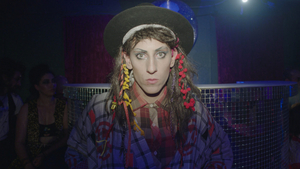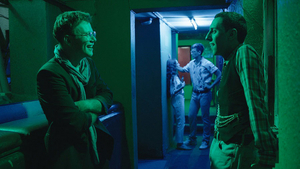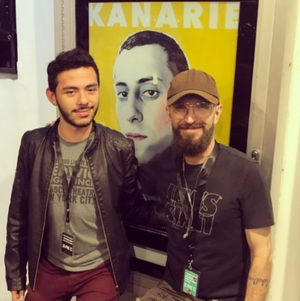Student Blog: Kanarie: From One “Smalltown Boy” To Another
Discovering a South African coming-of-age film about love, music and war

When I first worked for the Costa Rica International Film Festival (CRFIC), back in 2019, one of my first tasks was to screen every single movie that was selected for the festival. There were over 60 movies from all over the world. Some of them were interesting and portrayed realities so different from mine. And some of them were very abstract and gave me a tough time, and I have to admit I even considered falling asleep with a few of them. But there was one movie that made everything worth it.
And that's Kanarie (which means "canary" in Afrikaans), a South African movie released in 2018 and directed by Christiaan Olwagen, with a script written by Olwagen and Charl-Johan Lingenfelder. The film follows the story of Johan, a young, queer South African boy who loves music (especially anything related to the new wave) during the 80's, but his life changes when he's required to join the army. This movie is a hidden gem, and I might've never seen it if it wasn't for this film festival.
Kanarie has one of the most iconic opening sequences I've ever witnessed. It starts with Johan wearing a wedding gown in the middle of the street, as he lip syncs Bronski Beat's "Smalltown Boy". He's Boy George's #1 fan and he's constantly having these fantasy musical numbers in which he's dressed up like the Culture Club vocalist. He's actually having one of those, until he's interrupted by a reality check, when he's informed he has to join the army.
It's always been so hard for me to understand the impact something like that can have on a person because I live in a country where there's no army. Costa Rica's army was abolished in 1948, so we don't participate in wars.
Anyway, Johan has to go to war, but he goes on his own terms. First of all, he brings his vinyl collection, including one of his favorite records, Colour by Numbers, by Culture Club. Additionally, he decides to join the "Kanaries", this militar glee club that performs traditional songs at every town the troops go to.

Johan and Wolfgang at a club.
During this period, Johan struggles with society's expectations about masculinity, and he also tries to fight the attraction he feels for Wolfgang, one of his colleagues. But he's not only questioning his sexuality, he also begins to question his place in the army. What is he really fighting for?
I'm not giving away more details about the film, because I feel everyone needs to experience it. However, one of the biggest shocks for me was finding out the movie is semi-biographical. Charl-Johan Lingenfelder, one of the screenwriters I mentioned before, based the film on his own experience.
He also worked really hard in the music department, bringing to the audience some of the music he used to listen to when he was in the army. The soundtrack includes some hits from Culture Club, like "Do You Really Wanna Hurt Me?" and an outstanding choral arrangement of "Victims", and it even features some music by South African artists, like Lesley Rae Dowling. Charl even created a playlist with the music from this era.
I was really excited when I found out the film festival was going to bring Charl-Johan to Costa Rica as a special guest. A trip from South Africa to Costa Rica probably takes days, so I can't imagine all the effort that was made to make that happen. I had the privilege to meet him. I got to watch the movie again twice in movie theaters and I attended all Q&As and even a master class he gave.

Charl-Johan Lingenfelder at a
film festival in Costa Rica (CRFIC)
He's one of the nicest people I've ever met, so dedicated to his craft and so kind and humble. We bonded right away. It turns out he's a musical theatre nerd, just like me. He's worked in lots of musicals in South Africa, from Cabaret to Kinky Boots. Our backgrounds and contexts couldn't be more different, but somehow we both spoke the same language, the language of music and theatre.
I've been able to keep in touch with him, and we talk about anything, be it local productions of Chicago or my thoughts on Taboo, the underappreciated musical by Boy George. He's worked in other projects ever since Kanarie, including a South African version of The Seagull and a Christmas musical film he directed. It's hard to have access to all those films on this side of the world, though.
But watching Kanarie was a life-changing experience. I learned that every act is political, even singing in a chorus; you really have to choose your battles and be aware of the message you're putting out there in the world.
A quote from the film still resonates in my head. When a lady tells Johan "As soon as your cage door opens, you fly away". While Johan was trapped like a canary in a cage, some of us have the chance to fly and somehow we still decide not to do it. Sometimes we're prisoners of our own fears, and all it takes is a leap of faith to take flight.
Thanks to Kanarie, I also had the opportunity to meet Charl-Johan, a "Smalltown boy", just like me, whose story changed mine, and whose life is so different but somehow similar to mine at the same time.
Videos


